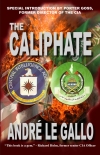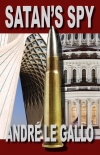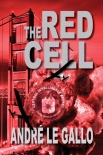The Caliphate by André Gallo (booksvooks .txt) 📗

- Author: André Gallo
Book online «The Caliphate by André Gallo (booksvooks .txt) 📗». Author André Gallo
The colonel with whom he had met walked him out of his office and gave him a promising handshake as he left, further bolstering Steve’s confidence. His next appointment was at a training camp, not far from Rabat, he had been told, whose commandant was interested in West Gate’s interactive software, Urban Warfare Tactics for Small Unit Leaders 2.0.—not at the top of Steve’s priority list. Nevertheless, it was a useful entrée to the training side of the FAR.
The ministry car assigned to him was waiting. They left at 10:25. As they headed out of town, Steve heard something loose in the trunk clanging against one side then the other on the turns and over bumps, as if the spare tire was not well secured. They were not quite beyond Rabat’s city limits when the driver received a call.
“Mr. Church, General Labibi has asked me to bring you back to the ministry,” the driver said. It was 10:38.
General Labibi was one of the heretofore unavailable principals. Steve hoped Labibi’s sudden interest meant his project was picking up traction with Labibi’s superiors. Steve decided to go back.
“I’ll be right back,” he told the driver, who parked in the street outside the Ministry entrance. “Keep that air conditioner on. I think something’s banging around in the trunk—can you hear it? Is it the spare?”
The driver merely shrugged.
Steve was inside General Labibi’s outer office for no more than five minutes when he, and most likely everyone else in Rabat, heard a thunderous explosion.
Shards of glass from the window flew across the room like arrows seeking their targets. A uniformed officer fell to the ground with a glass shard in his neck. The building rocked. Inside the offices of the Ministry, the blast was followed by several seconds of total silence.
Steve, the secretary to whom he was speaking, and the dozen officers and secretaries either sitting or walking through the office, froze as if the projector depicting their lives had stopped. They looked at each other questioningly for another second. Then the choreography broke down. The slow learners rushed to the windows, others attacked the telephones, and a few ran out. Steve heard a secretary stage-whisper, “It’s a coup!” The room reeked of fear born of confusion and uncertainty.
Since everyone was ignoring him, Steve extracted the glass from the fallen officer’s neck, grabbed a Moroccan flag from the wall, gave it to him to stop the bleeding, and walked out, suspecting damage but uncertain just how bad it would be.
Despite his expectation, the sight of the wreckage stopped him in his tracks. A half dozen people had reached the site of the explosion. Some had started to help the wounded. He walked the spot where his car had been, through still-falling small debris and dirt.
He put his handkerchief to his nose. It was abnormally quiet, as if the noise from the blast had stopped everything and everyone in the city. The only sound came from the several people on the sidewalk; the injured were moaning. He could see a deep hole in the street where the car had been parked. The twisted metal remains of the car were scattered over the street and the sidewalk. The chassis, on its side about twenty feet from the hole, burned fiercely at the base of a tall plume of black smoke.
He turned away from the heat of the burning fuel. His eyes scanned the bodies of the victims to try to find the driver. Drawn by dark trousers at the bottom of a garden wall adjacent to the ministry building, he walked around the bodies of the victims. He reached the dark trousers. The lower half of his driver's body was at his feet. A white hip bone contrasted with the intestines partially spilled on the ground in a widening pool of blood. The blast had pulverized the driver’s head and upper body. One shoe was missing. Steve’s insides tightened. He doubled over and vomited violently.
The constriction of his abdomen closed his eyes but he still saw the legs with the missing shoe. Suddenly it overlaid with a memory from Moldova several years before. He was looking at the body of his friend and Russian translator Misha, his head oozing blood from two small holes, his legs outstretched, one shoe missing.
***
Assigned by NATO to open an office in Chisinau, capital of Moldova, Steve had been driving with Misha to go meet with leaders of the breakaway Transnistria Republic on the Eastern side of the Dniester River. At Misha’s initiative, after driving for two hours they had stopped at a village for coffee. A waiter came to take their order.
Misha had said, “You need to taste mamaliga. It’s a local dish. I ordered it for you.”
After the waiter left, Misha picked up the menu and laughed. Reading from the back, he said, “Romanians have odd proverbs. Listen to this one. Muncat bine, baut bine, dimineatsa sculat mort. It means, ‘He ate well, he drank well, in the morning he was found dead.”
He laughed and shrugged his shoulders.
The waiter brought their coffee and their orders. Steve tasted his mamaliga and said, “This tastes no better than it looks. It’s cornmeal mush, right?”
Misha finished his coffee first and said, “I’ll meet you by the car. Take your time. Have the last gogosh.”
He got up and headed for the men’s room, and Steve reached for the donut that Misha had put on his plate. The waiter was not in sight and Steve waited for the bill. Eventually, he went to a heavy-set and heavily made up





Comments (0)